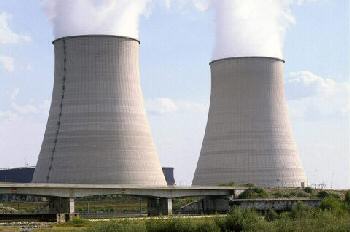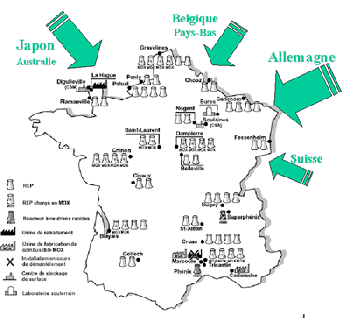This article concerns French nuclear policy and nuclear energy more generally.
Keywords: nuclear, energy, electricity, politics, power, waste, Eric Souffleux

Here is the data you need to keep in mind to discuss nuclear.
As you will see, I still evolved a little, clarified my position:
- First of all, I realize that by being "nuclear-tolerant", I am the only one able to relaunch the debate on nuclear power. The pros are for and caricature the position of the pros. The cons are against and caricature their position as well. It is difficult to have an objective debate if we are in one or the other of these camps. So it seems important to me that before any debates you initiate, you will have to dispassionate the debate and invite the protagonists to listen and to moderation. Here is a prerequisite which in my opinion will please your philosophy teacher.
- Then when we talk about nuclear power, and in particular its risks, it is advisable to compare them with the risks that we will run with the greenhouse effect. It is absolutely mandatory to compare the dangerousness of nuclear waste (confined and of a relatively low tonnage compared to other chemicals that we use every day in agriculture and in chemistry or petrochemistry) and waste: carbon dioxide that we do not contain today and that we leave to Mother Nature to take care of.
- With regard to the climate problem and in particular the argument of the anti-people who say that nuclear energy produces 7% of the electricity in the world (and less than 3% of the total energy consumed) and that it is therefore marginale, which would not make it a solution to the greenhouse effect. In fact, what must be understood is that 80% of electricity is produced from fossil fuel and that roughly, it must be reduced by a factor of 2 to 4 (depending on the evolution of other sectors and of demography) the share of electricity of fossil origin. This means that without reducing or increasing the existing nuclear share, the nuclear share should increase to probably 30 to 40% of the electricity produced. The rest is produced from renewable energy and a few percent from fossil fuels.
So nuclear energy is certainly marginal today, but it is unlikely to remain so if the fight against climate change is placed above the rest.
- However, we must not fall into blissful nuclearism. I quite like the reflection of Hubert Reeves who says that “nuclear energy is energy for angels”. That is to say, nuclear power should be used for limited and wise uses, because people are not immune to negligence. Most nuclear accidents and incidents are caused by human error. But men are what they are, there will always be a high risk of its doing. By limiting the need for nuclear energy, we will limit the risks due to ourselves. In my opinion, it is important to show the inefficiency of electric heating and its impact on the nuclear power plant in France. To cope with peaks in consumption in winter, the power plant fleet must be oversized, which encourages waste outside these periods and increases the nuclear risks in a reckless manner. For water or home heating, there is a solution for the future: solar heating coupled with wood heating. It is not a question of defending gas or fuel oil heating, which are very harmful from the point of view of greenhouse gas emissions.
- We must therefore, and this is an essential aspect of the debate, to know what we are going to do with nuclear power. Personally, I exclude the mission of heating water and heating the home (and also air conditioning, we go in both directions of course). What should nuclear power be used for? For example, should we develop nuclear power to develop the fleet of electric cars? (In my opinion, it's a headlong rush.) I believe that nuclear power should be reserved for three things:
1) Provide network subscribers a maximum of 15 kWh per week and per person, which excludes consumption peaks of the electric heating type. (Which would make 780 KWh per year and per person and therefore in France (60 million inhabitants) 46 800 000 000 kWh or 46 TWh. For the order of magnitude, EDF produced last year around 500 TWh ( there must be 60 TWh of export figures to verify but the orders of magnitude are there). So a priori by rationing electricity like this, we should divide by ten the existing power plant park!) The question arises for you thus: what can be done with 15 kWh per week? I set this threshold of 15 kWh because by measuring my own energy consumption, and also that of Eva, I found that we were at 20 kWh per week for two. So we can live very normally with 15 kWh since like everyone else, we have the computer, the TV, the light (but not the heating!) And a washing machine (so part of the electricity that we consumes is used to heat water to 40 ° C). At home, rationing at 15 kWh per week and per person would mean that you would be entitled to 15 kWh * 6 people = 90 kWh per week (and therefore 4680 kWh per year!). In my opinion, it is an essential civic initiative to feel your energy consumption.
2) Other use: provide electricity for trams, trains and all public transport systems electric (elevators, escalators, etc.). Nuclear electricity is then coupled with hydraulic power (which already supplies a good third of the electricity consumed by SNCF). I imagine that at the level of orders of magnitude, 2 to 5 reactors of 1000 MW should be enough but it is necessary to verify.
3) And finally nuclear energy must be the foundation of the renewable energy industry. We need to use nuclear power to produce large quantities of solar panels and to power machine tools with what will remain of our building industry, wind turbines, efficient cars, bicycles…. How many reactors? Probably as much as to supply public transport: 2 to 5?
Let's recap:
I exclude nuclear uses:
- domestic hot water heating (solar and biomass must be sufficient)
- home air conditioning (reinforced insulation, bioclimatic architecture and rationing of air-conditioned living areas)
- and also, I forgot to mention it previously, the continuous lighting of roads and advertising signs!
I dedicate nuclear power to the following missions:
- provide an electricity base all year round in the order of 15 kWh per week and per inhabitant. (6 reactors of 1000 MW)
- provide electricity to public transport (and also goods) electric (4 reactors of 1000 MW)
- provide electricity to our industry and in particular that of renewable energies (4 reactors of 1000 MW)

How many reactors in France today? 58. How much should we need with this strategy? 14!
Then comes another question: what kind of nuclear reactor?
I am a big defender of breeder reactors because they have the best efficiency and the best ratio of energy produced per gram of uranium.
It should be explained that today's nuclear reactors mainly consume light uranium (U235) which represents less than 1% of the uranium found in mines. Breeder reactors consume almost all of the uranium (their yield is 60 to 100 times better) but they need a reaction initiator: plutonium from conventional reactors, and also from the breeder (hence its name) , after reprocessing of waste (La Hague plant).
So logically we should say to ourselves that most of the 14 reactors that I recommend should be of the breeder type. We can leave 1 to 3 slow neutron reactors like those of today or like that of the EPR type.

And the last thing to see is the share of renewable energies that can replace part of these reactors, taking into account the intermittence of most of these energies.
Eventually (30 years? 60 years? 160 years?) The entire park to be stopped and completely replaced by solar power plants coupled with the storage of electricity in the form of hydrogen. But setting up such a system is likely to take a long time and there are so many other areas where energy will have to be saved.

